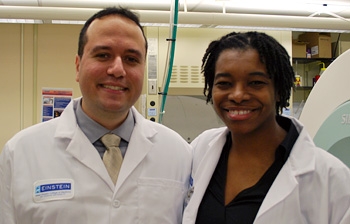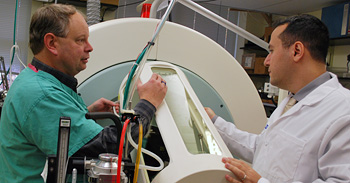

Gates Honors Research
Dr. Fernando Bruno Recognized by the Bill and Melinda Gates Foundation
Dr. Fernando Bruno, a former postdoctoral researcher in the laboratory of Dr. Mahalia Desruisseaux, was recognized by the Bill and Melinda Gates Foundation (BMGF) for a discovery that may help alleviate human suffering. He developed an imaging technique to study the pathological processes underlying cerebral malaria, an often-lethal complication of malaria that primarily affects children (adults in malaria-prone countries develop partial immunity after surviving multiple bouts).

Dr. Bruno with his mentor, Mahalia Desruisseaux, M.D.Dr. Bruno was selected for his BMGF honor from among past winners of the Young Investigator Award, given by the American Society of Tropical Medicine and Hygiene, which he received while conducting research as a member of Dr. Desruisseaux’s laboratory and its ongoing small animal imaging in cerebral malaria project. The project studies brain changes that occur during cerebral malaria using non-invasive imaging techniques in a mouse model. Dr. Bruno is now an assistant professor of general pathology at Touro College of Osteopathic Medicine, where he intends to continue his research.
Cerebral malaria is one of the deadliest diseases in the developing world. It causes nearly one million deaths each year, primarily in sub-Saharan Africa. Among children who survive cerebral malaria, more than 20 percent are left with neurological and cognitive impairment long after successful anti-malaria treatment.
In cerebral malaria, the malaria parasites never actually enter brain tissue Instead they injure the brain from within the vessels that supply it with blood. The mechanisms that underlie cerebral malaria’s effects—its acute damage and its lingering neurological deficits—remain largely unknown. One suspect was an abnormal activation of matrix metalloproteinases (MMPs)—enzymes that break down components of the blood-brain barrier critical to its integrity.
To study MMPs in his animal model of cerebral malaria, Dr. Bruno used a probe that tags MMP enzymes and fluoresces (lights up) in the near-infrared (NIR) region of the electromagnetic spectrum. This imaging technique revealed that the MMPs in the brains of his animal models were overexpressed compared with expression of MMPs in control (uninfected) animals. A second type of fluorescent probe assessed the integrity of the blood-brain barrier and showed that the blood-brain barrier was damaged.
“With this imaging, I saw that the blood-brain barrier becomes altered in cerebral malaria and found a relationship between increased MMPs in the brain and severity of the disease,” explained Dr. Bruno.

Dr. Bruno received technical assistance from microPET technician Wade Koba with imaging the mice in his studyHis discovery suggests that measuring brain levels of MMPs might be a way to monitor how cases of cerebral malaria respond to treatment in the clinic. Measuring MMP levels might also help in diagnosing cerebral malaria, which is difficult despite the disease’s prominent symptoms including seizure and coma.
“Cerebral malaria is currently diagnosed by documenting the presence of parasites in the blood of patients with neurological symptoms,” said Dr. Desruisseaux, who is assistant professor of pathology and of medicine at Einstein and an attending physician in medicine at Montefiore. “But many patients presenting with those symptoms will have parasites in their blood—since they live in areas where exposure to malaria is high—so other causes of neurological disorders, such as epilepsy and other underlying seizure disorders, need to be ruled out. We hope to build on Fernando’s research by designing radio-labeled MMPs that can be tracked using PET imaging, to help in more rapidly diagnosing cerebral malaria as well as monitoring its progression.”
“I’m deeply honored by the foundation’s recognition of my work,” added Dr. Bruno. “The countries where malaria is a burden don’t typically have the means to fully commit to research. I believe it’s our moral obligation to act, and the BMGF understands this. Their actions have been fundamental to advancing the field.”
Posted on: Wednesday, November 4, 2015

Tablet Blog